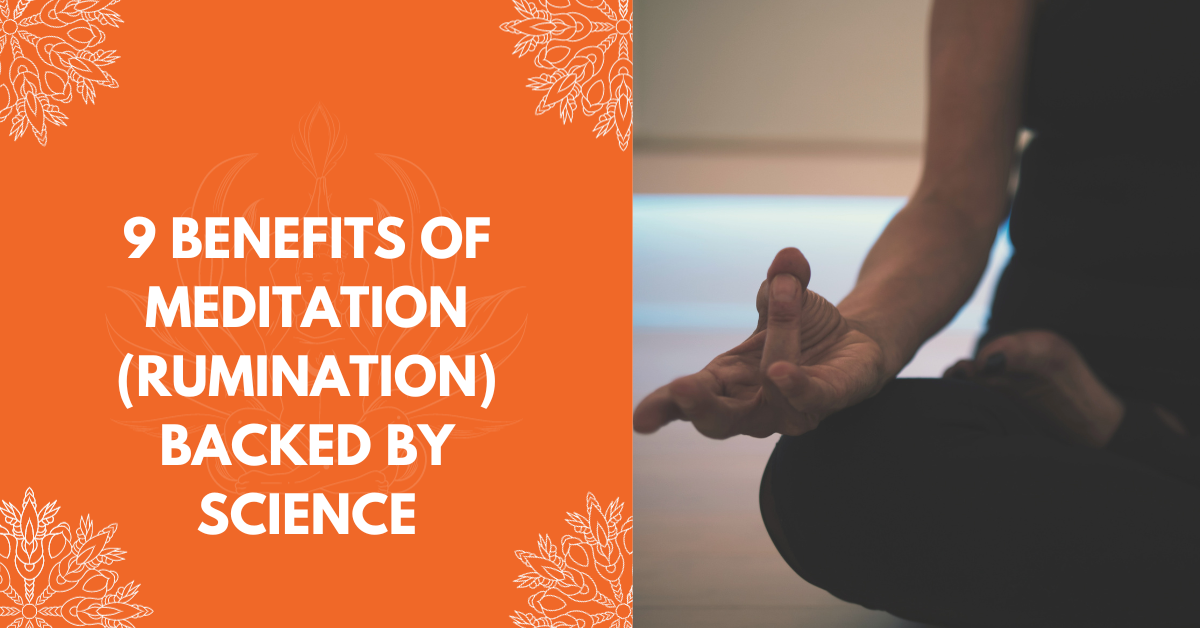
9 Benefits of Meditation (Rumination) Backed by Science
“Discover the power of meditation! 🧘♀️ Explore 9 amazing benefits that can transform your life. Boost mental clarity, reduce stress, and find inner peace today. 🌟 #MeditationBenefits”
In a fast-paced world filled with constant stressors and distractions, finding moments of peace and tranquility can seem like an elusive dream. Meditation is a powerful tool that can help you achieve that dream and unlock a myriad of benefits for your physical, mental, and emotional well-being.
1. The Benefits of Meditation
Meditation offers a wide range of benefits, and the effects can be profound and transformative. Let’s explore nine key advantages of incorporating meditation into your daily routine.
Stress Reduction and Relaxation
One of the most well-known benefits of meditation is its ability to reduce stress and induce relaxation. When you meditate, you activate the body’s relaxation response, which counters the stress-induced “fight or flight” response. Regular meditation practice helps lower cortisol levels, decrease muscle tension, and promote a sense of calm and tranquility.
Improved Mental Clarity and Focus
Meditation cultivates mental clarity and enhances concentration. It allows you to declutter your mind from the constant stream of thoughts, improving your ability to focus on tasks and make sound decisions. As you become more present through meditation, you’ll find your cognitive abilities sharpening.
Enhanced Emotional Well-being

Meditation encourages emotional balance and resilience. It helps you become more aware of your emotions, allowing you to respond to them in a healthier way. Over time, meditation can reduce mood swings and increase emotional stability, leading to a greater overall sense of well-being.
Better Sleep
Struggling with insomnia or poor sleep quality? Meditation can be a natural remedy. By calming the mind and reducing stress, it can help you fall asleep faster, stay asleep longer, and wake up feeling refreshed and rejuvenated.
Increased Self-Awareness
Meditation deepens your self-awareness by encouraging introspection and self-reflection. It helps you understand your thoughts, emotions, and behaviors more clearly, which can lead to personal growth and self-improvement.
Enhanced Creativity
Many artists, writers, and creative individuals use meditation as a tool to unlock their creativity. Meditation can facilitate the flow of new ideas and novel solutions by quieting the mind and allowing it to explore uncharted territory.
Reduced Anxiety and Depression
Numerous studies have shown that meditation can be an effective complementary therapy for anxiety and depression. It provides a sense of inner peace and teaches you to observe your thoughts without judgment, reducing the grip of these conditions on your life.
Pain Management
Meditation can alter the perception of pain by changing the way your brain processes pain signals. It has been used as a non-pharmacological approach to managing chronic pain conditions.
Boosted Immune System
Regular meditation has been associated with improved immune function. The reduced stress and inflammation that result from meditation can enhance the body’s natural defenses, helping you stay healthier.

2. How to Do Meditation
Now that you’re aware of the myriad benefits of meditation, let’s explore how to incorporate meditation into your daily routine. Meditation can seem daunting to beginners, but it’s a skill that can be developed with practice. Here’s a step-by-step guide to get you started.
Finding the Right Space
Choose a quiet and comfortable space where you won’t be disturbed. It could be a corner of your bedroom, a peaceful garden, or any place where you feel at ease. Creating a dedicated meditation space can enhance your practice.
Choosing the Ideal Time
Select a time that suits your schedule. Morning meditation can set a positive tone for the day, while evening meditation can help you unwind and prepare for restful sleep. Ultimately, the best time to meditate is the time that works for you consistently.
Comfortable Posture
Sit or lie down in a comfortable position. The most common meditation posture is sitting on a cushion with your legs crossed, but you can also sit in a chair with your feet flat on the floor or lie down on your back. The key is to find a posture that allows you to remain alert and relaxed.
Focusing Your Mind
The essence of meditation is to focus your attention. This can be done in various ways, depending on the type of meditation you choose. Here are some popular meditation techniques:

Breath Awareness Meditation
- Sit in a comfortable position with your back straight and shoulders relaxed.
- Close your eyes and bring your attention to your breath.
- Observe your breath as it enters and exits your nostrils or the rise and fall of your abdomen.
- If your mind starts to wander, gently bring your focus back to your breath.
Body Scan Meditation
- Lie down on your back with your arms by your sides and eyes closed.
- Start at your toes and gradually shift your attention up through your body, paying close attention to each body part.
- Notice any sensations or tension and consciously relax each area as you scan through it.
Loving-Kindness Meditation
- Sit comfortably and close your eyes.
- Start by focusing on yourself and silently repeat phrases like “May I be happy, may I be healthy, may I live with ease.”
- Extend this loving-kindness to others, such as friends, family, acquaintances, and even people you may have conflicts with.
Guided Meditation
- Find a guided meditation audio or video online or through a meditation app.
- Follow the instructions of the guide, who will lead you through a specific meditation practice.
- Guided meditations are excellent for beginners as they provide structure and guidance.

Mantra Meditation
- Choose a word, phrase, or sound (mantra) that holds significance for you.
- Sit comfortably and close your eyes.
- Repeatedly recite the mantra either silently or audibly, focusing your attention on it.
3. Tips and Precautions
While meditation is generally safe and beneficial, here are some important tips and precautions to keep in mind as you begin your practice:
Start Slowly and Progress Gradually
Don’t push yourself too hard in the beginning. Start with short sessions, such as 5-10 minutes, and gradually increase the duration as you become more comfortable with the practice.
Be Consistent
Consistency is key to experiencing the full benefits of meditation. Aim to meditate daily, even if it’s for a short time. Regular practice will help you build a strong foundation.
Patience is Key
Meditation is a skill that takes time to develop. Be patient with yourself and avoid self-criticism. It’s natural for the mind to wander, especially in the beginning.
Avoid Meditation After Heavy Meals
Meditating on a full stomach can be uncomfortable and may lead to drowsiness. It’s best to wait at least an hour after eating before meditating.
Seek Professional Guidance if Necessary
If you have a history of mental health issues or are dealing with severe emotional challenges, consider consulting a mental health professional before beginning a meditation practice. They can provide guidance and ensure that meditation complements your existing treatment plan.
Meditation Techniques: A Closer Look
Now, let’s delve deeper into some of the meditation techniques mentioned earlier:
Breath Awareness Meditation
Technique: As described earlier, breath awareness meditation involves focusing your attention on the sensations of your breath. You can count your breaths or simply observe the natural rhythm of your breathing.
Benefits: This meditation technique is excellent for beginners as it helps develop concentration and mindfulness. It can also be used as a quick stress-relief tool during the day.
Body Scan Meditation
Technique: Body scan meditation involves systematically bringing your awareness to different parts of your body, starting from your toes and moving upward. As you focus on each body part, you relax and release tension.
Benefits: Body scan meditation is effective for promoting physical relaxation and reducing bodily tension. It can also enhance your awareness of how stress or emotions manifest in your body.
Loving-Kindness Meditation
Technique: This meditation involves cultivating feelings of love, compassion, and kindness toward yourself and others. You silently repeat positive phrases or affirmations to foster these emotions.
Benefits: Loving-kindness meditation can improve your relationships, increase empathy, and enhance your overall sense of well-being. It’s especially useful for promoting feelings of goodwill and reducing hostility.
Guided Meditation
Technique: Guided meditation is a form of meditation in which you follow the instructions of a teacher or recorded guide. They may lead you through various visualization exercises, relaxation techniques, or mindfulness practices.
Benefits: Guided meditation is accessible and suitable for beginners, as it provides structure and guidance. It can address specific issues, such as stress, anxiety, or sleep problems, through tailored instructions.
Mantra Meditation
Technique: Mantra meditation involves repeating a word, phrase, or sound (mantra) silently or audibly. The repetition of the mantra becomes the focal point of your meditation.
Benefits: Mantra meditation can help calm the mind, deepen concentration, and create a sense of inner peace. It can also have a spiritual or transformative dimension for those seeking a deeper connection with their inner selves.
5. Diet Plan to Enhance Meditation
Diet plays a crucial role in supporting your meditation practice. While there are no strict dietary rules for meditation, certain foods can enhance your experience and well-being. Here’s a sample diet plan to complement your meditation practice throughout the day:
Morning Diet
- Start your day with a glass of warm water with lemon to aid digestion and refresh your body.
- Opt for a balanced breakfast that includes whole grains, fruits, and a source of protein. Examples include oatmeal with berries and nuts or scrambled eggs with vegetables.
Lunch Diet
- Choose a light and nourishing lunch that won’t make you feel sluggish. A salad with plenty of fresh vegetables, lean protein (chicken, tofu, or beans), and a healthy dressing is an excellent option.
- Incorporate whole grains like brown rice or quinoa to provide sustained energy.
Evening Diet
- Keep your evening meal light and easily digestible. Steamed vegetables, a small portion of lean protein, and a side of quinoa or brown rice are ideal.
- Avoid heavy, spicy, or rich foods close to bedtime, as they can disrupt your sleep.
Foods to Avoid
- Avoid caffeine and heavy meals immediately before meditation, as they can make it difficult to focus and relax.
- Minimize the intake of processed foods, sugary snacks, and excessive dairy, as they can lead to energy fluctuations and discomfort during meditation.
- Alcohol should be consumed in moderation, if at all, as it can interfere with your ability to meditate effectively.
Remember that the key is to listen to your body and make choices that support your meditation practice and overall well-being.
6. Conclusion
Incorporating meditation into your daily routine can be a transformative journey that leads to improved physical, mental, and emotional well-being. The nine benefits of meditation discussed in this guide, including stress reduction, enhanced focus, and emotional balance, are just the tip of the iceberg. The practice of meditation can bring about profound positive changes in your life.
As you embark on your meditation journey, keep in mind the importance of consistency, patience, and self-compassion. Meditation is not a quick fix but a lifelong practice that deepens over time.
By following the meditation techniques, tips, and precautions outlined in this guide and complementing your practice with a balanced diet, you can harness the power of meditation to create a more peaceful, centered, and fulfilling life.
7. Frequently Asked Questions (FAQs)
Q1: Is meditation a religious practice?
Meditation has roots in various religious and spiritual traditions, but it can be practiced in a secular and non-religious context as well. Many people practice meditation solely for its physical, mental, and emotional benefits without any religious affiliation.
Q2: Can anyone meditate, regardless of age or physical condition?
Yes, meditation is accessible to people of all ages and physical conditions. There are various meditation techniques, and you can adapt them to suit your individual needs and abilities. If you have specific physical limitations, such as mobility issues, there are seated and lying-down meditation options that can accommodate your needs.
Q3: How long should I meditate each day to experience benefits?
The ideal duration of meditation varies from person to person. Beginners may start with just 5-10 minutes per day and gradually increase the time as they become more comfortable with the practice. Many experts recommend meditating for at least 20-30 minutes daily to experience significant benefits, but consistency is more important than duration.
Q4: Can meditation cure serious medical conditions?
Meditation is not a replacement for medical treatment, and it should not be considered a cure for serious medical conditions. However, it can be a valuable complementary practice that supports overall health and well-being. Always consult with a healthcare professional for appropriate medical treatment.
Q5: What if I can’t clear my mind during meditation?
It’s normal for the mind to wander during meditation. The goal is not to eliminate all thoughts but to observe them without attachment or judgment. When your mind drifts, gently bring your focus back to your chosen point of attention, such as your breath or mantra. Over time, you’ll become more skilled at maintaining focus. Patience and practice are key.

